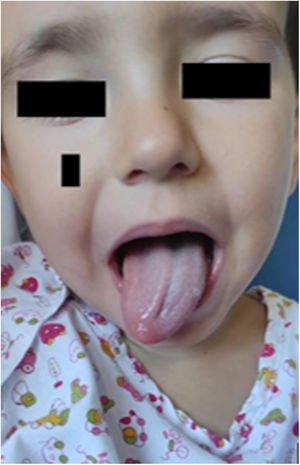We present the case of a boy aged 3 years with abrupt onset of lateral deviation of the tongue to the right on protrusion and difficulty chewing, without swallowing difficulties. There was no known preceding trauma. The physical examination revealed isolated paralysis of the right hypoglossal nerve (Fig. 1).
Neuroimaging scans showed bone abnormalities at the level of the craniovertebral junction and the cervical and dorsal spine (Fig. 2), suggestive of Klippel-Feil syndrome, which would explain the clinical presentation. This congenital syndrome is characterised by fusion of cervical and dorsal vertebrae and it may be associated with other malformations and neurologic abnormalities.
The patient remains clinically stable.
Hypoglossal nerve paralysis is rare in the paediatric population, and it is characterised by ipsilateral deviation of the tongue on protrusion and changes in the oral phase of swallowing.
The aetiological diagnosis is complicated and requires knowledge of the nerve’s course. It arises from the brainstem, travels in relation to the atlanto-occipital joint and exits the skull through a canal in the anterior occipital condyle. It passes by the internal carotid artery and enters the floor of the mouth to innervate the muscles of the tongue.1
Hypoglossal nerve paralysis is caused by tumours or has an iatrogenic or idiopathic aetiology in most cases,1,2 and it is rarely caused by trauma,3 vascular lesions or congenital anomalies such as Arnold-Chiari malformation.1










